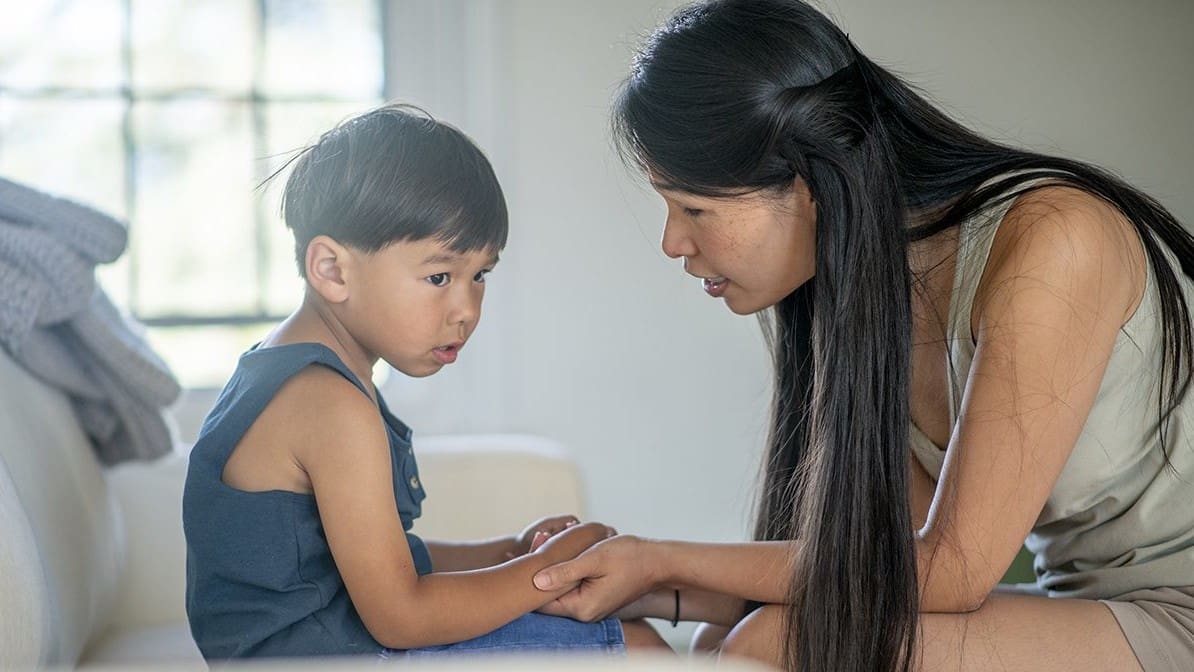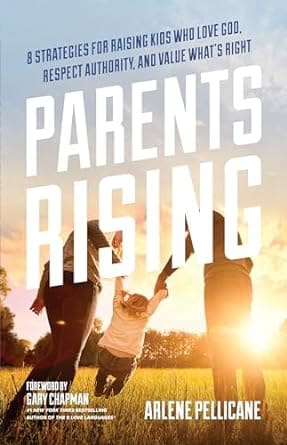
Arlene Pellicane and Parents Rising (Part 1)
 John Farrell: What was your inspiration and reason behind writing Parents Rising?
John Farrell: What was your inspiration and reason behind writing Parents Rising?
Arlene Pellicane: I was looking around and noticing that in many families the kids seem to be calling the shots more than the parents. This was becoming more and more common.
One instance that really stuck out in my mind was at my children’s elementary school. We were volunteering as parents and one of the little kids looked at one of the parent workers who had asked them, “Please get in line because we’re going to play a game.” The kid just looked at the parent worker and said, “Make me.” I thought, “Oh my goodness!”
My grandmother would have never looked at an adult, when she was a child, and said, “Make me.” It’s just this boldness in children to have that kind of disrespect that really made me think, “What is going on in our culture at large?”
What’s happening in families all around our country becomes then culturally acceptable all of a sudden to be disrespectful, let’s say, to a teacher or to a pastor or to a boss someday or to your spouse someday. Those kinds of situations that I kept seeing over and over again made me think, “I want to write a parenting book that’s just like a call to leadership and a call to parents to say, ‘You know what, we are certainly loving.’”
I’m not advocating at all that we become these strict dictators, but there does need to be more of a strength to parenting than we’re seeing right now.
JF: What would you say is the overall message you hope readers take from your book?
Arlene: I want that overall message to be that God has placed me in this family as a mother or father for a reason and I am to be honored and to be obeyed. And as a parent I’m going to try to grow into that as much as possible. To be worth that respect I’m going to grow into that.
For children, when they obey and honor their parents, they’re going to be so blessed by God. It’s so good for both the parent and for the child. To just bring a very simple hierarchy of children, “Obey your parents.” And when that happens, things go really well for everybody. But we flipped that on its head where parents are now obeying the children. “What would you like for dinner, dear? You want to play soccer and do ballet and be on cheer? Okay, I’ll drive you everywhere.” So, just for that heart of children obey the parents and not to get that switched around.
And then for parents to feel more confident in their role so that they don’t feel insecure about, “Can I really do this? I don’t know what I’m doing. Maybe my child is right.” And for parents not to choose the easier route, but to choose that harder route that’s going to make life easier for their child later on.
JF: Why is that message so important in today’s world?
Arlene: We live in a very child-centered world. If you just think about the home of yesteryear and maybe the home you and I grew up in, you could tell adults lived there. There were maybe toys in the backyard. Maybe there’s a bicycle and maybe in a kid’s room there were toys. But you look at today’s home – and this was always a joke – I remember when my kids were really little someone opened my front door to deliver a package and they said, “Oh, do you run a daycare?” I was like, “I’m a mom with three children.” But it’s because their toys were everywhere. That’s very common in a home today.
The kid has taken over both spatially with their things and also in our lives where a lot of energy is going to our kids. Of course, it’s good for energy to go to our kids, but in today’s age and culture we’ve kind of shifted to kid-centric and we need to bring it back to be more family-centric. Let the parents have that priority relationship together. That brings security to the children when they see mom and dad making a time for each other.
JF: Looking inwardly at yourself, what did you learn about yourself from writing Parents Rising?
Arlene: I think that I learned to appreciate my husband more because he brings a lot of strength and a different perspective than me. I’m the one that’s like, “It’s raining. I will drive you to school.” And he’s more like, “It’s raining. Just put on a rain jacket and get out.” So, just that appreciation for the other side of parenting so that my kids are stronger and better because they have their dad to push them, but I think the mom is necessary too. I think that’s also good.
Then, through interviewing different people for my books, like psychologist Sean Roseman, really helps me as a parent learn and grow. By seeking advice from other people. Seeking advice from people who are empty nesters likr, “What do you regret? What do you wish you would have done with your kids?” All those things were really helpful to me personally.
One of the things that I’ve heard over and over again was one of the things that people regretted with their older kids was giving them a phone and letting them have it overnight. Many of them said, “I wish I would have taken away the phone in high school and kept it with me and not in their room at night.” Things like that. If I hear that and I have an elementary school or junior higher, then it helps me think, “Okay, good. That’s already a decision that’s made. If my kids ever get a phone, then I will keep it overnight.” So things like learning from other people. That’s so helpful.
JF: How was this book different from your other books?
Arlene: This one is different because it is more of a leadership book. I have other parenting books that are completely about technology, and I have one parenting book that’s 31 Days to Becoming a Happy Mom, which is more concentrated on the mom and her attitude and happiness. This one is different because it’s both for the mom and the dad. Technology has a place in it – one of the chapters is “Amusement Is Not the Highest Priority” – but it’s more of a guidebook to parenting.
If someday, my first grandchild, years and years and years down the road, was born, then I’ll feel like, Oh good, I can give my children this Parents Rising book and say, “This is the advice mom would give to you.”
It’s a comprehensive plan for parenting. I say ‘plan’ lightly because I know parenting and people, it’s not a perfect plan. They’ll go different ways, but it is the idea of intentional parenting.
If I am trying to bake a chocolate chip cookie and I go, “I feel like putting this much salt and I feel like putting this much flour,” and I bake it, it might turn out awful. There’s a plan and there’s an intention and I’m going to follow this recipe. I’m going to follow these guidelines. That’s what I think this book does. It helps us to not just throw everything in the oven as a parent, but it helps us be more intentional. These are the elements that I need to be working on with my kids.
JF: What kind of worries or fears did you have while writing the book? Were there any chapters or topics in particular that you might’ve struggled with while writing?
Arlene: One chapter is called “Good Food Served on the Table.” It’s the idea of having family mealtime together because obviously that’s the time for connection, community, put your phones away, talk to each other, laugh with each other. I get that part, but it’s the being more nutritious. I love my sugar and I love all my junk food so that’s always a check to me.
I am advising people to be healthier, to be nutritious like the building blocks of your child’s body. You don’t want it to be built on chips and popcorn and pizza. You want it to have more than that. Those kinds of things are always a great reminder for me to have.
We’ve gotten better. We joke that we would always have salad be our vegetable. This tiny, poor, meek little salad. So, what they would work on is the salad, plus an actual vegetable. And broccoli seems to be our favorite. We just roast up the broccoli. Make it a little bit crunchy and the kids all eat that. So, basically that was a challenge of how can we be more nutritious?
Then I think the Bible and prayer being present every day that that’s something that’s so important it’s a principle in the book. And that’s a personal challenge because I can pray on the go, but are my kids really seeing me like, “Oh, there’s mom and she’s praying to God.” I need to be upping that so they can see that in me.
…
Order your copy of Parents Rising: 8 Strategies for Raising Kids Who Love God, Respect Authority, and Value What’s Right by Arlene Pellicane
Trending Now
Sign up today for your Inspiration Today Daily Newsletter
Supercharge your faith and ignite your spirit. Find hope in God’s word. Receive your Inspiration Today newsletter now!
John Farrell
John Farrell serves as the Digital Content Manager at Inspiration Ministries, where he oversees the planning, organization, and management of website content to support the ministry's global digital outreach. With a strong background in writing and editorial strategy, John ensures that the articles, devotionals, and discipleship resources on Inspiration.org are accurate, engaging, and aligned with the ministry's mission.
John has authored more than 1,000 articles, press releases, and features for Inspiration Ministries, NASCAR, Lionel, and Speed Digital. His versatility as a writer is also showcased in his 2012 book, The Official NASCAR Trivia Book: With 1,001 Facts and Questions to Test Your Racing Knowledge.
A graduate of Appalachian State University, John brings excellence and attention to detail to the digital experience at Inspiration Ministries. He lives in Concord, N.C., with his wife and two sons.
Related Articles
February 13, 2026
How to Find Joy in the Midst of Sorrow
Sorrow has a way of arriving uninvited—and staying longer than we expect. Loss reshapes our lives,…
January 30, 2026
What’s Happening to Your Family?
Families around the world are facing challenges that feel heavy, confusing, and unfamiliar. This…
January 14, 2026
How to Build a Stronger Marriage
When the same arguments keep resurfacing and distance quietly grows, it’s easy to feel stuck. If…
August 23, 2025
If God Is a Loving God, Why Is There So Much Pain in This Life?
Why is there so much pain in this life? This heartfelt article wrestles with that question through…
Next Steps To Strengthen Your Walk
Inspiration Today Newsletter
Supercharge your faith and ignite your spirit. Find hope in God’s word. Receive your Inspiration Today newsletter now!
Christian Articles
Find articles to strengthen your walk and grow your faith. We have a wide range of topics and authors for you.
Submit A Prayer Request
We are here for you. Simply click on the button below to reach us by form, email or phone. Together we will lift our hearts and voices with you in prayer.





